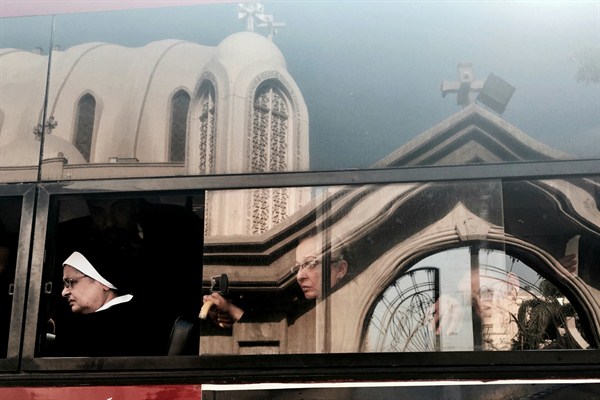By Frederick Deknatel – World Politics Review –

Relatives of victims of a church bombing after funeral services, Cairo, Egypt, Dec. 12, 2016 (AP photo by Nariman El-Mofty
A bomb ripped through a church in central Cairo last week, killing at least 26 people in the most brutal and brazen attack on Egypt’s Coptic Christian community in years. The self-declared Islamic State, which has been waging an insurgency against the government in the Sinai Peninsula since 2014, claimed responsibility for the suicide bombing of St. Mark’s Coptic Orthodox Cathedral, the seat of the Egyptian Orthodox Church. It vowed to escalate what it called a “war on polytheism,” a sign that it seeks to stoke more sectarian violence in Egypt and target the country’s beleaguered Coptic minority.
The attack was the worst violence against Egypt’s Christians since January 2011, when a suicide bomber struck a church in Alexandria and killed more than 23 worshippers, just weeks before the protests that ousted longtime President Hosni Mubarak began. Egypt’s Christians have long endured smaller-scale violence, including church burnings, murders, mob attacks and other discrimination. The perpetrators are rarely punished or held accountable.
The bombing was the latest sign that the strongman rule of President Abdel-Fattah el-Sissi, who has promoted himself as Egypt’s only defense against terrorism, is failing to protect Egyptians, including a Christian community led by Pope Tawadros II, the head of Egypt’s Coptic Church, that has been among el-Sissi’s strongest supporters. The attack capped days of unrest in the country, including an explosion at a security checkpoint in Cairo near the pyramids that killed six police officers and another in the town of Kafr el-Sheikh, in the Nile Delta, which targeted police and killed a passerby.
Although the church bombing was a brutal escalation in tactics for Egyptian militants, for the country’s Christians, it also reflected a growing trend of religious discrimination under el-Sissi.
The Tahrir Institute for Middle East Policy maintains a database of sectarian violence against religious minorities in Egypt, and as The Guardian’s Ruth Michaelson noted, it counts 54 such incidents this year. That includes a prayer hall that was attacked and burned down near the city of Minya in May, which has been a hotbed of mob violence and other attacks against Copts for years. The database also lists many instances of incitement and harassment that Egypt’s Copts know all too well.
These trends began before el-Sissi came to power. Anti-Christian attitudes are pervasive in Egyptian society. But still many blame el-Sissi for worsening the situation by tolerating incitement and upholding legal restrictions on Copts, who make up about 10 percent of the population. “When the state sets sectarianism as its example, it’s hardly surprising that society follows suit,” Timothy Kaldas, a nonresident fellow at the Tahrir Institute, wrote after the church bombing.
Last summer, Egypt’s rubber-stamp parliament passed a law regulating church construction that observers widely condemned as discriminatory, since it makes it even harder to build Christian houses of worship. As Human Rights Watch noted, the law “allows governors to deny church-building permits with no stated way to appeal, requires that churches be built ‘commensurate with’ the number of Christians in the area, and contains security provisions that risk subjecting decisions on whether to allow church construction to the whims of violent mobs.”
The Tahrir Institute’s database, which goes back to 2013, includes a map of Egypt that shows attacks on churches dotting the Nile Valley, from Alexandria to Aswan. “A majority of the country does not even accept that Christian citizens should have the right to build houses of worship as easily as Muslims can build mosques,” Kaldas added. “The different standards–and in the case of Christians, the more restrictive standards–drive structural and state-sanctioned inequality.”
Terrorism feeds off this public tolerance, and even acceptance, for prejudice against Copts. The Islamic State’s tactics, therefore, are an attempt to sow deeper divisions in an already-damaged social fabric. “The shift to targeting Egypt’s most vulnerable community should not be seen in isolation as a mere tactical innovation,” Michael Wahid Hanna, a senior fellow at the Century Foundation, wrote recently. “Instead, the vulnerability of Egypt’s Christians should be understood more broadly, as a function of their status as second-class citizens in their own country.”
El-Sissi’s move to quickly identify the suicide bomber and appear publicly with Pope Tawadros made clear how alarmed his government is by the prospect of losing support from Christians, especially at a time of ongoing economic malaise. Yet it was mainly window dressing over the structural barriers to religious and social equality that he has done nothing to dismantle.
“The normalization of notions of second-class citizenship, even through non-violent ideologies or practices, creates a more permissive environment for sectarian violence,” wrote Hanna, whether that is in sermons at mosques, on state-sanctioned media, or through the actions of provincial governments blocking a church from being built. “It should not be at all surprising that a society that views and treats a segment of its population as less than fully equal is also a society that produces violence and terrorism against it.”
The availability of weapons in Egypt only makes matters worse. While the Sinai is a smuggler’s paradise, western Egypt shares a porous border with war-torn Libya, where another branch of the Islamic State holds territory amid a smattering of rival militias. The tight grip of the state in el-Sissi’s Egypt has put thousands of activists in jail and tried to bar protests from the streets in the name of security, but for whom? The country remains “a sprawling hub for explosives like TNT,” Mohannad Sabry, the author of a book on the Sinai, recently told the Associated Press. “Just take a look at all the improvised explosive devices going off in Sinai and that the government claims it has seized–we are talking tons.”
It isn’t hard to see why the Islamic State eyes Egypt as the next place to light a fuse for sectarian violence. But the group won’t be the only one to blame for the firestorm.
_______________
http://www.worldpoliticsreview.com/trend-lines/20746/like-previous-egyptian-leaders-el-sissi-has-failed-to-protect-coptic-christians
Via AINA





